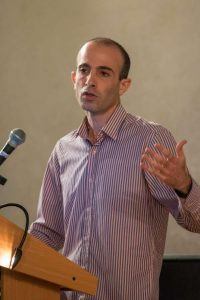From Secular Humanism:
 In 2015, Israeli historian Yuval Noah Harari published Sapiens, a sweeping and widely acclaimed history of humankind. In it, he discusses a phenomenon he calls “humanism.” Humanism, as he defines it, is a family of “religions (that) worship humanity, or more correctly, homo sapiens.” This worship of humanity, he argues, has made modernity “an age of intense religious fervor, unparalleled missionary efforts, and the bloodiest wars of religion in history.” The crimes of genocidal Nazism, Stalinist communism, and environmental destruction, he argues, can all be traced to the central tenets of humanism. If Harari is right, humanists need to engage in some serious soul-searching.
In 2015, Israeli historian Yuval Noah Harari published Sapiens, a sweeping and widely acclaimed history of humankind. In it, he discusses a phenomenon he calls “humanism.” Humanism, as he defines it, is a family of “religions (that) worship humanity, or more correctly, homo sapiens.” This worship of humanity, he argues, has made modernity “an age of intense religious fervor, unparalleled missionary efforts, and the bloodiest wars of religion in history.” The crimes of genocidal Nazism, Stalinist communism, and environmental destruction, he argues, can all be traced to the central tenets of humanism. If Harari is right, humanists need to engage in some serious soul-searching.
In mid-2017, Tom Flynn, editor of this magazine, responded with an editorial arguing that Harari’s “extreme and factually untethered” critique effectively “smears” humanism (“Smearing Humanism,” FI, June/July 2017). A. P. (Andy) Norman, a humanist philosopher and frequent contributor to Free Inquiry, shared Flynn’s concerns but found that he was able to view Harari’s efforts in a more charitable light. For if you grant Harari his definition of humanism, much of the rest seems to follow. Moreover, the resulting story—a kind of revisionist take on modernity—does contain important insights. Nevertheless, Norman reached out to Harari with a plea to rethink and rescind his critique of humanism. Harari replied, and the ensuing exchange is presented here, with only minor edits. The issue, it turns out, has profound implications for the humanist movement and its historical legacy.
More here.
